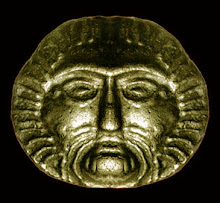A sharp surge in terrorist attacks, attributed to al-Qaida in the Islamic Maghreb (Aqim), is threatening pro-western Algeria's political stability even as it struggles to defuse popular discontent sparked by the Arab spring, according to a new study. The rising violence is partly linked to the Nato-led war in next-door Libya, which appears to have fuelled jihadist sentiment and activity and increased the availability of weapons.
A study by Andrew Lebovich published by the Combating Terrorism Centre at the West Point military academy in the US charts a rise since April in Aqim outrages, including several suicide bombings, largely aimed at the Algerian security forces. "The months of July and August witnessed at least 23 attacks, including 13 IEDs [improvised explosive devices], six gun attacks, and four suicide bombing attempts," it says.
A number of factors could explain the escalation, including security force complacency symbolised by the dismantling of local militias, known as groupes de legitimes defense, which fought Islamist militants during the 1990s civil war. The northern Algerian branch of Aqim is a direct descendant of the Salafist Group for Preaching and Combat of that period. Government opponents have also blamed President Abdelaziz Bouteflika's reconciliation policy for going soft on terror.
But a connection between the surge in violence and the British and French-led intervention in Libya is the most persuasive explanation, the study suggests. It notes Algerian and other African leaders have warned since March that chaos in Libya could destabilise Algeria by encouraging jihadist attacks and the movement of militants back and forth. They also suggested "that Aqim could gain possession of arms stolen from Libyan stocks".
"Evidence has since emerged that surface-to-air missiles and other unspecified weapons have been looted from Libyan stores, weapons that, according to European officials, have fallen into the hands of Aqim" – most likely via Aqim criminal affiliates in the ungoverned Sahel regions to the south, the study says.
Lebovich sees a number of possible consequences if the violent trend continues upwards, including growing friction between the military and the Bouteflika administration, reviving suspicions that the army may be somehow manipulating the terrorist groups (as alleged during the civil war), and even a return of the feared eradicateurs – kill squads that ruthlessly exterminated the militants at every opportunity. "Regardless of what emerges from the infighting and tension in Algeria's ruling classes, it seems likely that Aqim's violence will continue to increase in the north," Lebovich concludes.
The Aqim resurgence comes as Algeria's rulers try to avoid an Arab spring-style popular insurgency. Government efforts to date to buy off unrest, funded by oil and gas revenues, include big salary increases for civil servants, raised subsidies on basic foodstuffs, and a lifting of the state of emergency dating back to the civil war. Bouteflika, whose health and staying power are in question, has also promised reforms including an amended constitution, new electoral laws, and a press code.
But these and other measures implemented since riots broke out in Algiers in January cannot overcome some systemic problems, according to the analyst Hamoud Salhi.
"So far the policy of appeasement and concession has worked well for the Algerian government. But for how long? There are severe housing shortages in Algeria, accompanied by high consumer prices and low salaries. According to the IMF, unemployment rates have reached 25% among 24-year-olds, widening gaps between social classes," Salhi wrote in a BBC analysis. "Algeria has not necessarily weathered the storm."
Other experts and the US government have also got the jitters about a possibly violent spillover. "Aqim poses the greatest immediate threat of transnational terrorism in north-west Africa and is escalating its attacks against regional and western interests," said Andre Le Sage, writing for the US National Defence University's Institute for National Strategic Studies.
Policymakers were concerned that more direct American involvement might exacerbate Islamist militancy and internal tensions in Algeria and elsewhere, he said. Nevertheless, given the growing threat, the US "needs to be prepared to take more aggressive actions to disrupt, degrade, and ultimately defeat Aqim and should clearly determine in advance what level of increased Aqim activity would represent a direct threat to US national security interests".
In a possible sign of a more activist approach, the US embassy in Algiers issued a public terrorism alert earlier this month, saying it had information that Aqim was planning to attack planes chartered by western oil companies operating in the Algerian Maghreb. General Carter Ham, head of US Africa Command, warned, meanwhile, that there were "very worrying" indications that Aqim was increasingly co-operating with al-Shabaab in Somalia and Boko Haram in Nigeria – raising the spectre of an Islamist militant network spanning the continent.
In a statement many Algerians may view as a decidedly mixed blessing at a time of domestic political weakness and uncertainty, the US state department said Algeria continued to be "one of our strongest partners" in the fight against terrorism.




No comments:
Post a Comment